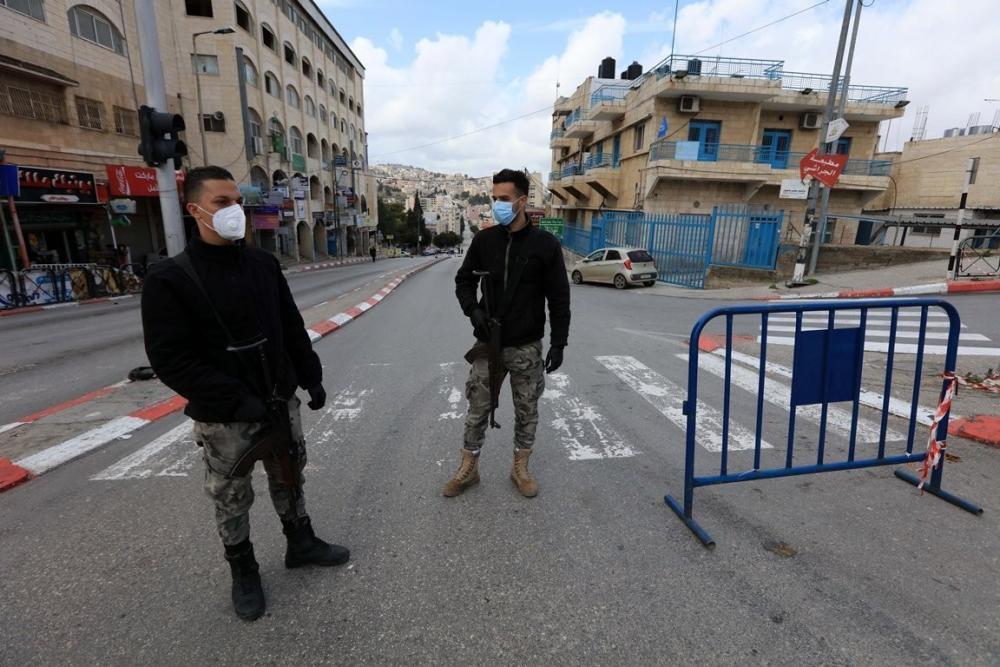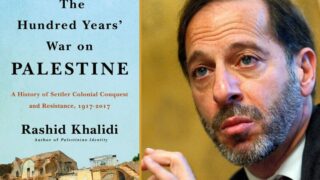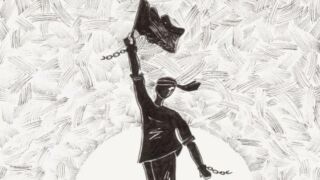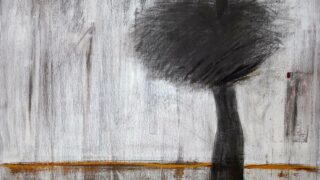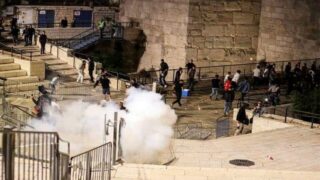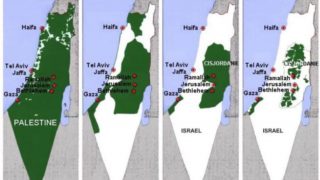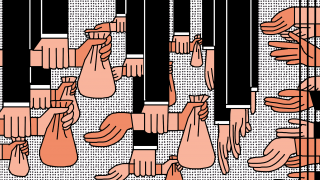
This publication has benefited from the support of the Rosa Luxemburg Foundation. This text may be reproduced in part or in full, provided the source is acknowledged.
The “Palestinian National Authority” (PA) killed Nizar Banat after going on camera and speaking out strongly against the Covid-19 vaccine deal between Israel and the PA. Through it, the Palestinian Ministry of Health had accepted that Israel would receive the new Pfizer supplies in its stead and, in return, the PA would receive near-expired vaccines from Israel.
Banat revealed the affair by naming the conspirators involved, clearly holding the responsible parties to account. He explained the risks, analysed the incentives, and urged people to mobilise in protest and in rejection thereof, and to have the popular responsibility to protect the wellbeing of their children and fight the corruption of the PA. He challenged the Attorney General (who “imprisoned a diabetic kid in the exercise of a common right, as the latter had disparaged the Authority”) to maintain the “public right” in holding those responsible for the dangerous deal to account and take them to court. Some investigative journalism and leaks to the press confirmed that it was Banat’s position on the vaccines deal that directly led to his assassination.
What Banat couldn’t learn before his murder, however, and what we didn’t know until the findings of the independent commission of inquiry were released on Tuesday (July 6th, 2021), is that the question wasn’t about their expiry date alone. The details are rather much more dangerous; to say that they built up to a crime, prevented thanks to protest, would be no hyperbole at all.
To execute the deal and receive the vaccines, the Palestinian Ministry of Health had sent one sole administrative employee from the Department of Primary Care. He wasn’t directly related to the vaccination roll-out and lacked any qualification or experience to carry out such a task. There, the Israelis handed over the vaccines, with boxes addressed to Ofer Prison (!), which is a military detention centre west of Ramallah.
The commission also noted that the deal was completed without the presence of a data registrar, the person in charge of documenting all the data and information throughout the exchange. In other words, the vaccines arrived with a mere memorandum of receipt, and lacked any information about the boxes’ contents. While the doses require a storage temperature of minus 70 degree Celsius, they were handed over to the Palestinians after they’d been thawed at 2 to minus 8 degrees Celsius. The Israelis provided no information or documentation about the date the doses had been thawed.
Palestine is Back as a Given
21-06-2021
With such horrific negligence, 93,600 doses of the Covid-19 vaccine were delivered to the Palestinian Ministry of Health and redistributed to the governorates that same day (because they know when they expire). They underwent neither examination nor testing by the Ministry of Health and lacked any documents to verify their period of validity – as per internationally recognised scientific standards of distribution, such as displaying the vaccine’s refrigeration conditions. The commission of inquiry also found that, besides being discriminatory, the agreement relieved the Israelis of any responsibility over the doses. To top it all, the commission found no justification or need for concluding that deal, neither to accommodate the pandemic situation in Palestine nor to stock up the Ministry of Health vaccine supplies. The report notes that the deal was an Israeli proposition, and found US “support” as a step towards “trust building” between the Palestinians and the Israelis!
About that trust!
The only “trust” that should indeed be deliberated about this deal is the Palestinians’ trust in the PA that manages the Covid-19 crisis. It is key to understanding the Palestinian community’s behaviour during the pandemic.
Ever since March 2020, the PA management of the Covid-19 crisis reflected intricate elements: the state of the Palestinian healthcare system, abandoned and smothered for many years; the PA’s political and media priorities, which relegated medical and scientific considerations; the high-level coordination with the Occupation, how the PA helped Israel shirk its legal and international responsibilities towards Palestinians’ health; and, finally, corruption files related to the distribution of the vaccines to the PA and President Mahmoud Abbas’ entourage. In parallel, the PA abandoned its role of providing social welfare to people in the face of a pandemic, rather channelling the social solidarity required in such a case into a festival of applause to capitalists who bestow donation funds upon the people.
The pandemic exposed the social frailty of the West Bank at its most painful: from the collapse of hospitals to a rise in domestic violence rates, degenerated food security, and a rise in poverty and unemployment rates.
The PA tried to realise success through the only infrastructure it owns and handles with utmost care: security. The emergency law was enforced and extended time and again, cities were cut off from one another, and curfew imposed. Streets filled with checkpoints, as governors, informers, and Fatah youth hit the streets to show off the force of “law enforcement”, while stores that continued to work off the radar were raided.
The PA turned towards forming a fund (Stance of Pride) that the private sector managed, to which major companies voluntarily donated, handing out donations and gifts to applicants. Talal Nasser al-Dine, director of Birzeit’s pharmaceutical company, headed the fund. As he headed the fund, he raised drug prices in the West Bank at rates that reached 60 percent of their original price, all at the height of the pandemic!
Here, it goes without saying that people’s trust in their governments and medical systems are a central element to managing an epidemic situation. In the West Bank, however, the pandemic landed into a critical situation that the PA had been living, completely shaking people’s trust in it. Its political legitimacy had waned. Further segregation and the political impasse in responding to Trump-Netanyahu policies rendered the PA’s existence even more ridiculous and absurd than ever before. As the world watched, a popular mood prevailed in the West Bank; it clearly recognised the banality of the PA’s role. The trust crisis, however, wasn’t merely political…
One year before the outbreak of Covid-19, Palestine was home to a number of serious crises in its medical system. Those turned into highly tumultuous public opinion cases, which exposed the corruption of the PA and subjugated the medical administration to problematic political and opportunistic standards that have nothing to do with healthcare or medicine. Throughout 2019 alone, Almuttala’a Hospital in Jerusalem had to stop receiving cancer patients as the PA stopped paying its dues to the hospital; its debts owed to the hospital reached more than 60 million USD. Almakassed Hospital in Jerusalem had a similar experience. The case of the American Hospital in Gaza equally blew over, which raised a violent controversy between Fatah and Hamas, as political tug of war reigned over medical and humanitarian questions. Doctors called many a strike as instants of aggression against medical personnel were on the rise and the Ministry of Health broke all their promises of taking measures to protect medical staff.
Another question that stirred up Palestinian public opinion in the West Bank was the case of An-Najah National University Hospital management. Just a short while after the government and its media outlets celebrated the “historic” scientific achievements of heart surgeon Dr Saleem Haj Yahia, appointed a Chair at An-Najah National University Hospital in Nablus, former Prime Minister Rami Hamdallah went and removed him from his position, without providing any rational justification, all the while insulting him and belittling his academic qualifications across media channels! And if all this weren’t enough, we shall recall one of the first and most important decisions that Prime Minister Mohammad Shtayyeh made that year: holding up medical transfers of Palestinian patients into Israeli hospitals, redirecting them to receive treatment abroad.
In a reality in which the PA, its capitals, and security systems are sinking into daily exchanges and relations with the Occupation, the prime minister found but patients to sacrifice on the altar of performance, flexing his muscles with lies of “breaking away” from the Occupation.
The situation in the West Bank deteriorated to such horrific levels. Then, by the end of 2020, it became clear that people have given up. As usual, dealing with the pandemic turned from a disease that calls for awareness and anxiety into an inevitable destiny before which one is powerless. The PA managed to sow despair in people in terms of their demands and protests against the management of the pandemic.
Under such circumstances, with almost total distrust in the PA, the latter needed to showcase itself and its achievements in crisis management; it considered it a chance to validate their control, raison d’être, and competence to rule (and this “competence to rule” is the slogan imposed on the PA to restructure it, following the second intifada). Naturally, to realise success in crisis management is a blessed and desirable aim, but only if that attempt is run through objective medical and scientific tools and considerations that have people’s safety and lives in mind. However, under a collapsed healthcare infrastructure: hospitals are unequipped and underfunded, medical staff exhausted and lack basic essential gear, extreme shortage of beds, ventilators, and medicine, feeble infrastructure crucial to fighting the pandemic like clean water and sanitation, overpopulation, and lack of open spaces… in light of all this, the PA’s attempt cannot but rely on its own system, which knows but one language…
The armed solution to Covid-19
The PA tried to realise success through the only infrastructure it owns and handles with utmost care: security. The emergency law was enforced and extended time and again, cities were cut off from one another, and curfew imposed. Streets filled with checkpoints, as governors, informers, and Fatah youth hit the streets to show off the force of “law enforcement”, while stores that continued to work off the radar were raided. The PA moved towards repressive measures in this manner until cruel measures were imposed that prevented families from burying their dead, without medical justification. As the entire world limited some freedoms as one tool of many to fight the pandemic, the PA had no other preventive tool but to limit freedoms and violate rights.
Such a security approach wasn’t only a politically worrying detail or a mere violation of rights; it also resulted in a number of serious sanitary implications in which hundreds of lives were lost, but could’ve been saved. In addition to a general distrust in the medical institutions and the PA’s crisis management, the adopted security measures were disproportionate, and extreme in degree and timing, which were introduced very early on and quite a while before the pandemic actually broke out in the West Bank. Doctors and experts had warned against this; they insisted that a strict lockdown, which turned into a show and a theatricality, (rather than a gradual introduction of restrictions) before an actual epidemic situation had developed would result in an epidemic outbreak months later and all at once, and would thus unravel in hospitals collapsing under pressure and losing many lives. And this, indeed, is what happened.
Insistent on flexing its muscles, the PA imposed, during the first wave, a curfew in cities where not one case had been recorded. Movement between all governorates was blocked, and society drained under enormous economic burdens.
At best, and according to exhibitionist data issued by the Minister of Labour, during one and a half years of lockdowns and restrictions, only 70 thousand people (in both the West Bank and Gaza, that is, among more than a million workers!) were given an allowance that doesn’t exceed 200 USD, and just once.
The United Nations report stated in mid-2020 (with the crisis just beginning!) that a sharp rise was recorded in contacting women centres. The Working Woman Association alone, for instance, received more than 510 phone calls to notify it of violence committed against women… in just two weeks!
With the second wave, people’s rebellion started, and a fait accompli was created of violating governmental guidelines. Once it realised the catastrophic situation, and because its main incentives lie in saving political face, the PA exited the scene. Considering its attempt doomed to failure, it refrained from enforcing guidelines and restrictions; it turned a blind eye to a complete state of disarray, saving security face, as the disease spread and took the lives of more than 2,400 Palestinians in the West Bank alone. Beds and hospitals filled up, especially in the northern West Bank, and people tried to manage on their own and find, through relations and acquaintances, an empty bed in any other city to treat their loved ones.
Even the effort of looking for vacant hospital beds wasn’t listed as a healthcare task. To a large extent, this could explain the age distribution of death cases, which shows an increase in death rates among the younger generations – those who could’ve been truly saved. For example, the percentage of Covid-19 deaths in Israel under 70 doesn’t exceed 24 percent, whereas in the West Bank it reaches 47.6 percent! (Data retrieved from both Ministries of Health website, July 6th, 2021).
Systematic exits
One could think of “the PA exiting the scene” as a tactic it uses in many domains. While it initially relied on its security arm then withdrew once failure peeped ahead, it withdrew from other domains too all along the crisis. Perhaps the exit that stands out most began in the first few days of the crisis, when the PA’s intention to virtually fully retreat from its economic and social responsibilities began to show, following the pandemic and charge the private sector with that responsibility.
The crisis showed, in an unprecedented manner, the reality of Palestinian economy created in the West Bank. Since Day One, the private sector, with its companies and major banks, has played a central role in devising economic “solutions”. Instead of a national configuration that offered support as a legal right paid to people as compensations, the PA turned towards forming a fund (Stance of Pride) that the private sector managed, to which major companies voluntarily donated, handing out donations and gifts to applicants. Talal Nasser al-Dine, director of Birzeit’s pharmaceutical company, headed the fund. As he headed the fund, he raised drug prices in the West Bank at rates that reached 60 percent of their original price, all at the height of the pandemic!
This is how the Stance of Pride fund turned into the most major and central backbone of economic support – companies that donate negligible sums in comparison with their profits harvest enormous coverage and media publicity, and bestow upon the people a meagre sum of 150 USD… to an entire household, and just once! Once this fund’s role was over, the role of the World Bank was up – to offer affected workers (one out of each family) an allowance of 200 USD, and just once. At best, and according to exhibitionist data issued by the Minister of Labour, during one and a half years of lockdowns and restrictions, only 70 thousand people (in both the West Bank and Gaza, that is, among more than a million workers!) were given an allowance that doesn’t exceed 200 USD, and just once. Likewise, the PA was unable to provide any real support to the places it ordered to close down or to the workers it forced to stay home. Reductions in fees and taxes seemed arbitrary and inexplicable in the first place, and were quickly reversed.
The Monetary Authority devised some “assistance” which quickly exposed its true face and proved to simply postpone debt repayment but increase interest rates. That is beyond the extremely insufficient support given to social services and institutions affiliated with the PA, which are meant to aid society under such conditions, like housing and protection centres for women – as domestic violence and femicide peaked during the pandemic. The United Nations report stated in mid-2020 (with the crisis just beginning!) that a sharp rise was recorded in contacting women centres. The Working Woman Association alone, for instance, received more than 510 phone calls to notify it of violence committed against women… in just two weeks!
The exit approach also applies to the question of vaccine distribution. There, the PA proceeded with a scandalous wave of corruption to vaccinate President Mahmoud Abbas and his entourage first, as well as senior men in power, their families, and friends. The PA offered vaccines as political blackmail to faction leaders and directors of human rights institutions. With no honest distribution or fair vaccination system, and amidst “begging” for vaccines here and there and, as such, the intermittent arrival of vaccines, people had to sort it out for themselves, even in this. The web of corruption began to branch out, descending from the top of the pyramid and its surroundings to a comprehensive state of favouritism and connections, through which each individual tries to fend for themselves by resorting to their own personal connections in order to protect their family. There were also those who tried to acquire the vaccine through Israelis by checkpoints and in “points of contact”, from workers in foreign NGOs in the West Bank or relatives from the West Bank who worked inside Israel. The Israeli principle there was that it vaccinated those, or their relatives, who are permitted to enter Israel. In other words, Palestinians are eligible for the vaccine only if they potentially threaten an Israeli’s health.
Despair flounders
The situation in the West Bank deteriorated to such horrific levels. Then, by the end of 2020, it became clear that people have given up. As usual, dealing with the pandemic turned from a disease that calls for awareness and anxiety into an inevitable destiny before which one is powerless.
The Resurgent “Arab Economy” of Palestine
30-05-2021
The PA managed to sow despair in people in terms of their demands and protests against the management of the pandemic. It became clear that nothing could save the collapsed medical system – neither the daily enumeration of ventilators nor debates around the number of beds; and waiting for financial and social benefits from the PA seemed like a waste of time. Instead, people returned to business as usual despite the PA’s decisions, restrictions, and guidelines. The PA, in turn, turned a blind eye. Things reached a point where we could never begin to handle the cumulating economic burdens. Let us sacrifice our health and lives, then, to feed our children and live the remainder of our lives with the least amount of dignity possible.
Things reached a point where we could never begin to handle the cumulating economic burdens. Let us sacrifice our health and lives, then, to feed our children and live the remainder of our lives with the least amount of dignity possible. Such despair, however, planted by the PA, floundered once they criminally assassinated Nizar Banat. Every day now, there go women and men in the West Bank forging a new phase in their fight against the tyranny and corruption of an authority that protects the Israeli Occupation.
Such despair, however, planted by the PA, floundered once they criminally assassinated Nizar Banat. Not only because he’s a human armed with nothing but his voice, conscience, discourse, and people’s respect, but also because he was killed against a backdrop of a PA that despicably managed Covid-19. It took away loved ones from their people because they found no bed in no hospital, and made people pay the price of disease and jeopardise their health in return for bread. This assassination slapped the people to awaken from a depressive slumber of despair, moving them, in the West Bank, against injustice. Every day now, there go women and men in the West Bank forging a new phase in their fight against the tyranny and corruption of an authority that protects the Israeli Occupation.
The content of this publication is the sole responsibility of Assafir Al-Arabi and Rosa Luxemburg Foundation cannot accept any liability for it.
Translated from Arabic by Yasmine Haj
Published in Assafir Al-Arabi on 08/07/2021

